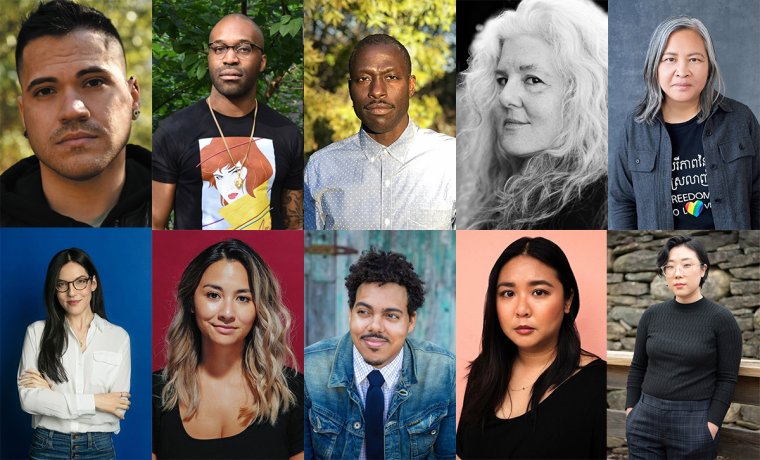Since Poets & Writers Magazine debuted Ten Questions in 2018, two hundred and fifty authors and translators of creative nonfiction, fiction, and poetry have pulled back the curtain on their writing lives, offering a peek at what they read, how they work, and what they’ve learned while composing and publishing their books. While some of the questions may change from interview to interview, or from year to year, the final question has consistently sought the counsel passed down to writers during their careers, amassing a deep pool of wisdom from which our readers may draw: What’s the best piece of writing advice you’ve ever received? Below are ten memorable answers from 2022.

Clockwise from upper left: Xavier Navarro Aquino, Tochi Onyebuchi, Roger Reeves, Dana Levin, Putsata Reang, Franny Choi, E. M. Tran, Jonathan Escoffery, Mia Mercado, and Sloane Crosley. (Credit: Onyebuchi: Christina Orlando; Reeves: Ana Schwartz; Levin: B. A. Van Sise; Reang: Kim Oanh Nguyen; Choi: Francesca B. Marie; Tran: Melissa Tran; Escoffery: Cola Greenhill-Casados; Mercado: Chase Castor; Crosley: Beowulf Sheehan)
“It’s not really explicit advice, but it’s certainly stayed with me. ‘If we don’t tell our stories, someone else will tell them for us.’” —Xavier Navarro Aquino, author of Velorio
“‘Fail brilliantly.’ I think I got that from Elizabeth Bear, but I may be misattributing it. But that’s gotta be it. Felt like I was being given permission to do the dangerous thing, the weird or unconventional thing, the thing I wasn’t quite sure I could pull off. Writing at the edges of my abilities thrills and terrifies me, and it’s in those moments that I feel most connected to whatever higher state or power this writing thing puts me in communion with. The advice isn’t just to do the dangerous thing, it’s to put all of your ability, your wisdom, your knowledge of the craft, your experience, all of that into the effort. Stretch yourself as far as possible. Who cares that you didn’t get the moon if you come back with a fistful of stars?” —Tochi Onyebuchi, author of Goliath
“Get out of the way of the writing. Don’t make it precious. Sit down and get to it.” —Roger Reeves, author of Best Barbarian
“A paraphrase from Jack Kerouac: Don’t stop to think of the words, stop to see the scene better.” —Dana Levin, author of Now Do You Know Where You Are
“I don’t know if I have the quote completely correct, but it was Anne Lamott who said something on the order of: ‘One bad page a day leads to a book.’ It’s such great advice for a writer, especially a writer who dreams of being published. Books do not write themselves. And it takes a superhuman commitment to stay in the chair and do the work. And doing the work doesn’t mean sitting down and pulling out a perfect story from thin air. It’s letting yourself write terribly, and laying those awful and embarrassing pages as a foundation to keep getting better. Let yourself have those bad pages, what Anne Lamott calls ‘shitty first drafts.’ No one gets it right the first time, or second time. It took me ten drafts to get to a place of ‘finished enough’ on my memoir. Just keep writing—the good, the bad, the ugly. All of it. One day you’ll look up from your computer and realize you’ve just finished a whole book.” —Putsata Reang, author of Ma and Me
“Turn off the phone.” —Sloane Crosley, author of Cult Classic
“It was something like, ‘The goal is to stay.’ It helped shift my mind-set from focusing on trying to hit some big, ‘career-making’ writing achievement; I recognize that, if I want to continue writing as a job for the foreseeable future, having steady, consistent, sustainable work is crucial. It’s also a helpful ego-check/reminder that no one is ‘too good’ for any kind of work. The second best piece of advice is to stop Googling the ages of people you think are more successful than you.” —Mia Mercado, author of She’s Nice Though: Essays on Being Bad at Being Good
“My first writing professor, John Dufresne, gave all of his students this advice, which has aged well with me: Better done than good. Which I take to apply specifically to first drafts. In my younger days, I hated revision and turned a corner in my writing life when I realized that revision is everything. Revision is not just where you make it good, revision is where you figure out what it is. A terrible draft of a story is a gift, because now the real work can begin. But you can’t revise nothing.” —Jonathan Escoffery, author of If I Survive You
“Aim for one hundred rejections—it recasts the rejection as a goal achieved, rather than a failure. And along the way you’re sure to have a success you didn’t expect.” —E. M. Tran, author of Daughters of the New Year
“‘You only funky as your last cut.’ —Andre 3000, often quoted by my friend, the poet Nate Marshall.” —Franny Choi, author of The World Keeps Ending, and the World Goes On








